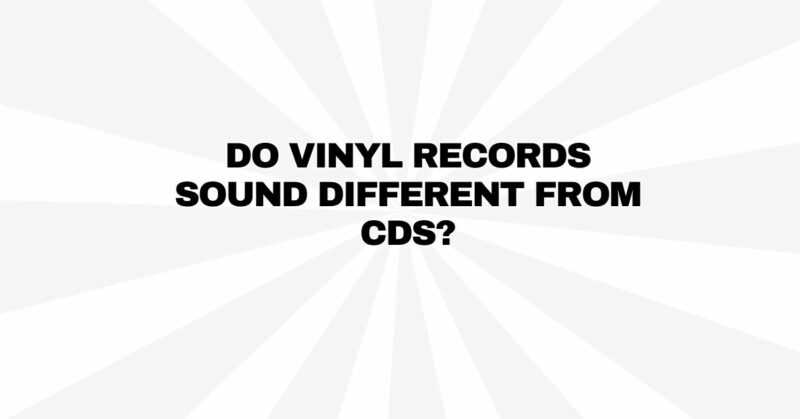In the realm of music listening, few debates are as enduring and passionate as the comparison between vinyl records and compact discs (CDs). Both formats offer distinct listening experiences, and the question of whether vinyl records sound different from CDs remains a topic of fascination for audiophiles and music enthusiasts alike. To answer this question comprehensively, we’ll explore the technical and perceptual differences between the two formats, examining factors such as analog vs. digital sound, dynamic range, imperfections, and subjective experiences.
Analog vs. Digital Sound:
The primary distinction between vinyl records and CDs lies in the way they capture and reproduce sound:
- Vinyl Records: Vinyl records are an analog format. When music is recorded onto vinyl, it is physically etched into the record’s surface as grooves. Playback is achieved by placing a stylus in the grooves, which translates the analog signal into audible sound. This analog process is celebrated for its warm, rich, and organic sound quality.
- CDs: Compact discs, on the other hand, are digital. Music is recorded as a series of 0s and 1s on the disc’s surface. CD players use lasers to read these digital data and convert it back into analog audio. CDs are known for their accuracy and precision, resulting in a clean and faithful reproduction of the recorded music.
Dynamic Range:
Dynamic range refers to the difference between the softest and loudest sounds in a recording. It plays a crucial role in how music is perceived:
- Vinyl Records: Vinyl records often offer a wider dynamic range compared to CDs. This means that vinyl can capture and reproduce subtle nuances in the music, such as the delicate plucking of a guitar string or the quietest whisper of a singer. Audiophiles appreciate this wider dynamic range for its ability to convey the full emotional range of the music.
- CDs: CDs also have a good dynamic range, capable of faithfully reproducing both quiet and loud passages. However, some argue that the dynamic range on CDs may be slightly narrower than that of vinyl, potentially affecting the perception of certain subtleties in music.
Imperfections and Artifacts:
Another aspect of the vinyl vs. CD debate revolves around the imperfections and artifacts associated with each format:
- Vinyl Records: Vinyl is known for its imperfections, which can include surface noise, pops, clicks, and occasional distortion. Some listeners, particularly audiophiles, argue that these imperfections are part of vinyl’s charm, akin to the way film grain adds character to movies shot on celluloid. To them, these analog quirks contribute to a more authentic and engaging listening experience.
- CDs: CDs are designed to eliminate imperfections associated with analog formats. They offer a consistent listening experience with minimal surface noise or artifacts. However, some listeners feel that this precision can make CDs sound “sterile” or “lifeless” compared to vinyl.
Subjective Experiences and Preferences:
Ultimately, the perception of whether vinyl records sound different from CDs depends on individual preferences, the listening environment, and the quality of the playback equipment. Here are some factors to consider:
- Equipment: The quality of the turntable, cartridge, and speakers used for vinyl playback, as well as the quality of the CD player and speakers for CD playback, can significantly impact the perceived sound quality.
- Listening Environment: The acoustic properties of the room in which you listen to music can influence how you perceive sound. Factors such as room size, acoustics, and ambient noise can affect the listening experience.
- Music Genre: Some argue that certain genres, particularly those with acoustic instruments and rich instrumentation, benefit more from the analog warmth of vinyl. Others find that digital formats like CDs excel in capturing the clarity and precision needed for complex music compositions.
- Personal Taste: Ultimately, personal taste plays a significant role. Some listeners prefer the analog warmth and imperfections of vinyl, finding it more engaging and emotionally resonant. Others appreciate the precision and cleanliness of CDs, valuing their convenience and fidelity.
Conclusion:
In the vinyl vs. CD debate, the key takeaway is that both formats offer distinct listening experiences. Vinyl records are celebrated for their analog warmth, wider dynamic range, and imperfections, while CDs are known for their precision, clarity, and reliability. Whether vinyl records sound different from CDs ultimately depends on the listener’s perspective, preferences, and the context in which the music is enjoyed.
Ultimately, the “better” format is a matter of personal taste. Many audiophiles and music enthusiasts enjoy both vinyl and CD for their unique qualities, and their choice often depends on the specific music they are listening to and the experience they seek. Both formats have their place in the world of music, offering different but equally valid ways to connect with the artistry and emotion of the music.


